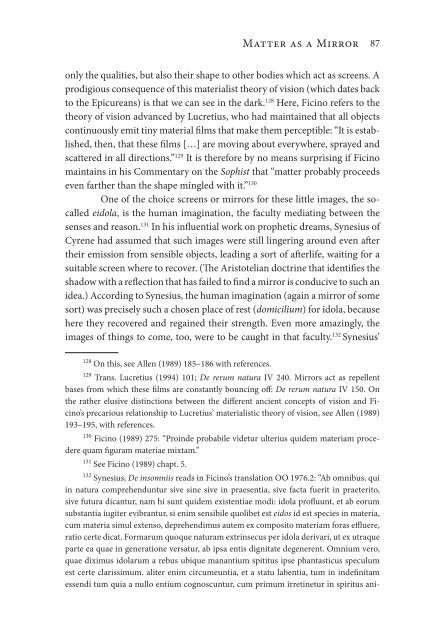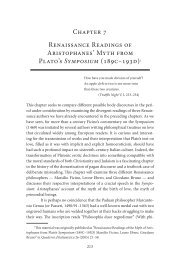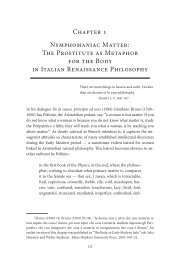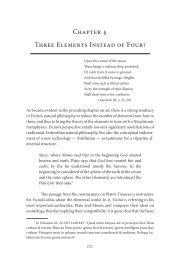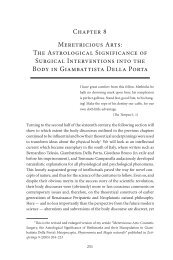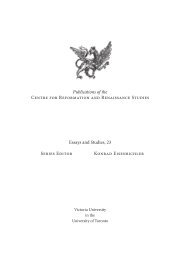Chapter 2 Matter as a Mirror: Marsilio Ficino and Renaissance ...
Chapter 2 Matter as a Mirror: Marsilio Ficino and Renaissance ...
Chapter 2 Matter as a Mirror: Marsilio Ficino and Renaissance ...
Create successful ePaper yourself
Turn your PDF publications into a flip-book with our unique Google optimized e-Paper software.
<strong>Matter</strong> <strong>as</strong> a <strong>Mirror</strong> 87<br />
only the qualities, but also their shape to other bodies which act <strong>as</strong> screens. A<br />
prodigious consequence of this materialist theory of vision (which dates back<br />
to the Epicureans) is that we can see in the dark. 128 Here, <strong>Ficino</strong> refers to the<br />
theory of vision advanced by Lucretius, who had maintained that all objects<br />
continuously emit tiny material films that make them perceptible: “It is established,<br />
then, that these films […] are moving about everywhere, sprayed <strong>and</strong><br />
scattered in all directions.” 129 It is therefore by no means surprising if <strong>Ficino</strong><br />
maintains in his Commentary on the Sophist that “matter probably proceeds<br />
even farther than the shape mingled with it.” 130<br />
One of the choice screens or mirrors for these little images, the socalled<br />
eidola, is the human imagination, the faculty mediating between the<br />
senses <strong>and</strong> re<strong>as</strong>on. 131 In his influential work on prophetic dreams, Synesius of<br />
Cyrene had <strong>as</strong>sumed that such images were still lingering around even after<br />
their emission from sensible objects, leading a sort of afterlife, waiting for a<br />
suitable screen where to recover. (The Aristotelian doctrine that identifies the<br />
shadow with a reflection that h<strong>as</strong> failed to find a mirror is conducive to such an<br />
idea.) According to Synesius, the human imagination (again a mirror of some<br />
sort) w<strong>as</strong> precisely such a chosen place of rest (domicilium) for idola, because<br />
here they recovered <strong>and</strong> regained their strength. Even more amazingly, the<br />
images of things to come, too, were to be caught in that faculty. 132 Synesius’<br />
128 On this, see Allen (1989) 185–186 with references.<br />
129 Trans. Lucretius (1994) 101; De rerum natura IV 240. <strong>Mirror</strong>s act <strong>as</strong> repellent<br />
b<strong>as</strong>es from which these films are constantly bouncing off: De rerum natura IV 150. On<br />
the rather elusive distinctions between the different ancient concepts of vision <strong>and</strong> <strong>Ficino</strong>’s<br />
precarious relationship to Lucretius’ materialistic theory of vision, see Allen (1989)<br />
193–195, with references.<br />
130 <strong>Ficino</strong> (1989) 275: “Proinde probabile videtur ulterius quidem materiam proce-<br />
dere quam figuram materiae mixtam.”<br />
131 See <strong>Ficino</strong> (1989) chapt. 5.<br />
132 Synesius, De insomniis reads in <strong>Ficino</strong>’s translation OO 1976.2: “Ab omnibus, qui<br />
in natura comprehenduntur sive sine sive in praesentia, sive facta fuerit in praeterito,<br />
sive futura dicantur, nam hi sunt quidem existentiae modi: idola profluunt, et ab eorum<br />
substantia iugiter evibrantur, si enim sensibile quolibet est eidos id est species in materia,<br />
cum materia simul extenso, deprehendimus autem ex composito materiam for<strong>as</strong> effluere,<br />
ratio certe dicat. Formarum quoque naturam extrinsecus per idola derivari, ut ex utraque<br />
parte ea quae in generatione versatur, ab ipsa entis dignitate degenerent. Omnium vero,<br />
quae diximus idolarum a rebus ubique manantium spititus ipse phant<strong>as</strong>ticus speculum<br />
est certe clarissimum. aliter enim circumeuntia, et a statu labentia, tum in indefinitam<br />
essendi tum quia a nullo entium cognoscuntur, cum primum irretinetur in spiritus ani-


